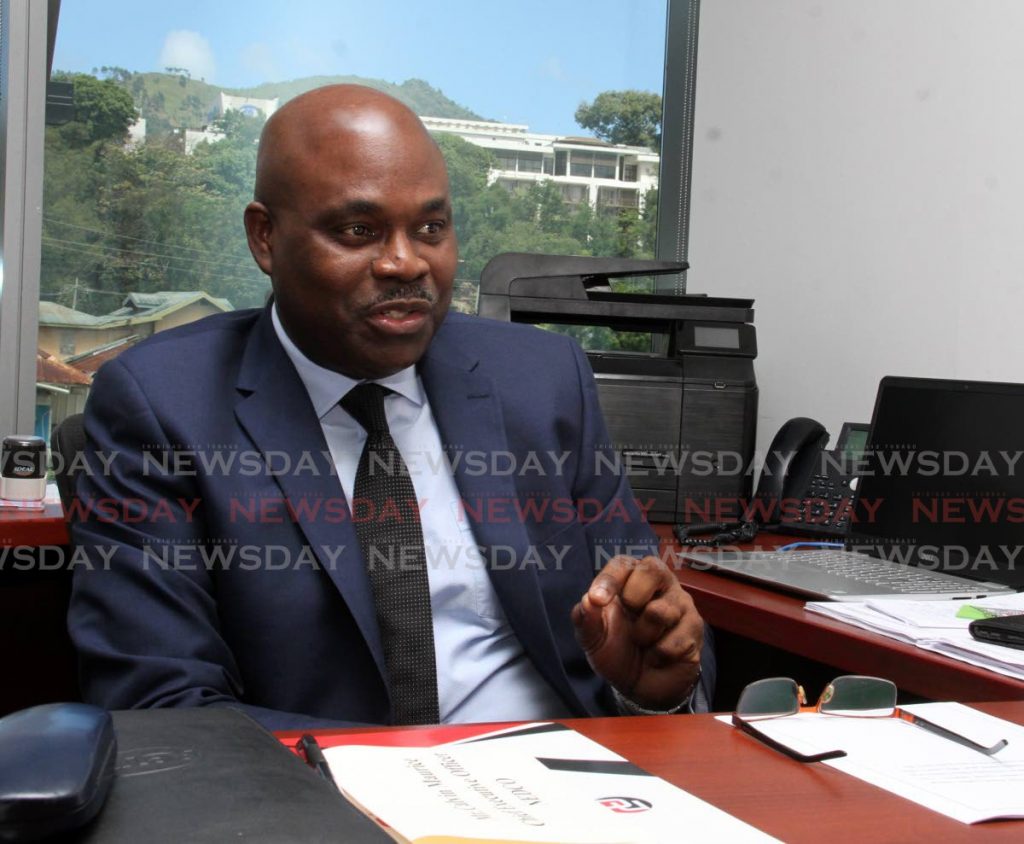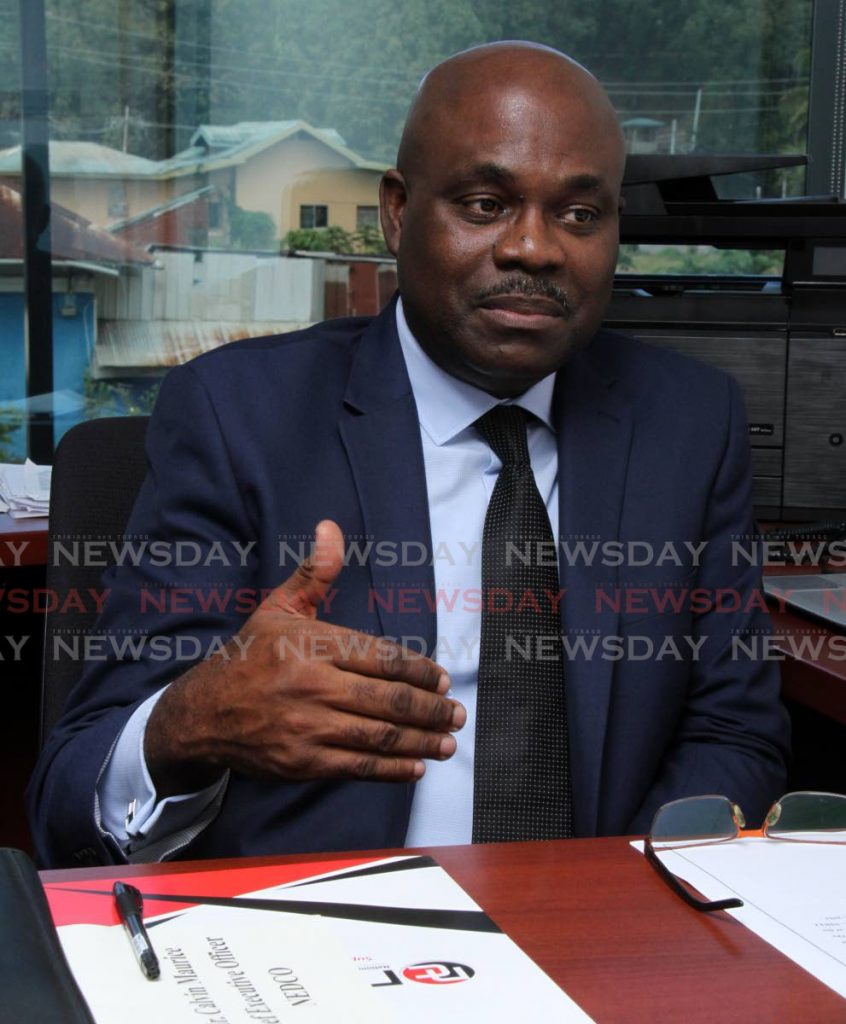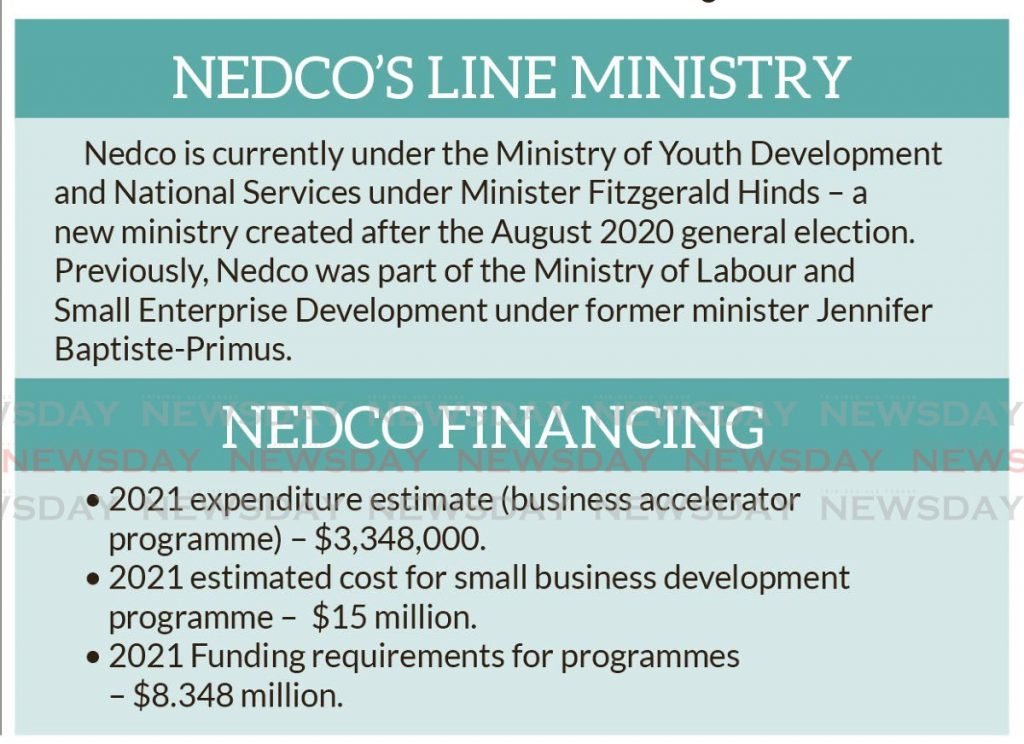Nedco CEO: Start a business, it's worth the risk

Young people are often discouraged by their parents from going into business because they think it's too risky. It's a risk worth taking, says National Entrepreneurship Development Company (Nedco) CEO Calvin Maurice, encouraging anyone to follow their business dreams, no matter their age.
There's support available, such as the newly formed partnership between Nedco and the Caribbean Industrial Research Institute (Cariri) to assist entrepreneurs in expanding their businesses to the next level and making them sustainable.
“It gives them the opportunity to re-invent themselves and to develop their products, which is an area of training we haven't focused on significantly for micro-entrepreneurs. We haven’t explored innovation for entrepreneurs. This partnership provides the man in the street with that opportunity they didn’t have before, to be diverse and experimental. Cariri will help develop the product, market test it and move them to commercialisation stage, while we will do micro-financing and further developmental training they would need.”
Maurice said Nedco was developing and working towards international best practices and he felt micro-entrepreneurs should grow with that type of development, enabling them to be more consistent.
“Commercialisation is different from home-use. Someone who is making jam for example, what’s the mechanism of giving it a shelf life, for setting aside sample groups, etc. What’s the management of taking that from prototyping into commercialisation? You need to make about 2,000 bottles, and each batch needs to taste the same all the time. The content has to be a certain way, and the person will be taught how to do it the same way over and over again, unless they wish to make a different blend. Partnering with Cariri will give them the capability to expand when compared to bigger businesses that can do all these different things.”
He said a constant question asked at Nedco was “how do you move micro-entrepreneurs to release that micro-entrepreneurial mindset for a big business mindset?"

"How do you train them to understand the different steps for sustainable development, and to understand that they’re not doing it for themselves alone, that their children will take over the business and it can be handed down from generation after generation? Expanding a business also generates employment, so more people are able to earn a livelihood.”
Helping SMEs to step forward
There were 25,000 small- and medium-enterprises in TT in 2018, according to Maurice. He said Nedco will be going out soon to collect data on what businesses are out there, which he said was complicated by the fact that some entrepreneurs don’t register their businesses.
“Nedco will want to provide a platform where these businesses can register, get income tax numbers, and register with NIB, for ease of doing business, but more than that, we’ll be able to answer the question of how many people are employed by SMEs and what categories they are in, because other than collecting the data we’d be guessing.”
Maurice said of the SMEs that approached Nedco for loans, the majority were transport – including taxi services and maxi taxis – followed by retail, and then light manufacturers, including fashion, food, woodworking and jewellery. He said there not many people had approached Nedco for technology-based enterprises, other than to acquire devices for online shopping and marketing, though he hoped this would change through the partnership with Cariri.
“We also want to encourage projects with as much local content as possible in terms of both raw materials and human resources. We have a number of manufacturing type industries in TT but 20 to 30 per cent of the raw materials they use is imported, so in developing a business model we have to look at local content. We have a number of existing businesses, like the cocoa industry, local teas, Moruga hill rice, etc, it’s just to promote and develop them so they can provide products that can have good shelf life and so on.”
He said an entrepreneur is defined globally as someone who is a risk-taker in business and has the capacity to take a level of risk.
“SMEs generally have a lower budget arrangement with respect to expenditure when managing their business. Nedco considers micro-entrepreneurs as people who earn under $1 million a year in terms of gross earnings.”
Maurice said Nedco’s mandate of getting young people involved in business had not changed since its inception, but it was also looking at other areas of the mandate.

“Our cabinet note says our core clients are the unbankables, people who have an idea but can’t start a business, the people the banks turn away, who can’t go to the bank and borrow $100,000 to start a coffee shop. We are there for them, those who get offered nothing, we have the mandate to turn these dreams into something for people who have nothing.”
He said many clients were single parents who were running a business to support their families.
“Before covid19, they would have had a full-time job and a part-time job to earn extra money. With covid, their part-time job has become a full-time job that allows them to work from home and take care of their children, and this has been helped greatly by the ability to buy and sell online.”
Breaking risk-averse thinking
He said Nedco also has to cope with the risk-averse mentality of Trinidadians, who have been taught for years how to work for others.
“Somehow university students believe they don’t need to get into business, they go to school, get a job and become employed but there are so many opportunities for entrepreneurial development and starting businesses for them. Schools teach you the correct skills to work for people, but different skills are needed to have your own business, it’s a whole different strategy. There are a lot of success stories out there now, as we’ve seen more people having their own business over the years, in some cases because the job market is declining and there’s no other choice.”
Maurice said while there is a focus on youth, Nedco also has senior clients who are doing well. He said some of the requirements for these older clients would be insurance and life insurance, but exceptions could still be made.
“There’s also a need for senior citizens to provide mentoring, training and business advisory services. During global entrepreneurship work, we had 700 people who came in wanting information. We have a list of 200 people who wanted business advisory services, so within a couple weeks we will be sending out a request for people to apply to provide these services on a consultancy arrangement. That’s where experience comes in, senior citizens can be engaged to provide that level of service because of the level of talent they have.”
Maurice said people who want to apply to Nedco for loans should be able to provide a business plan, which the entity can help them to develop, if necessary, some form of collateral, and undergo a 360-degree risk assessment to determine what the gaps are in the business idea.

“Some of the questions we’d ask are, how long have you been in business? Have you been trained? What level of clientele do you have? These are the things we look at, because you have to be able to repay a loan. Depending on the business, we are willing to re-engineer our approach for businesses that are not the regular type. If you open a coffee shop, you’re able to repay loan instalments almost immediately, but if you open a film company or a drama group or service-type business, then it’s mitigated against earnings, your cash flow arrangement, and your turnover and Nedco has to remodel its financing arrangement and the cycles in which this person would be required to repay that loan.”
Bad debt means no loans for others
Maurice said many people felt that Nedco was too stringent in its loan requirements and should be more lenient when it came to loan repayments because it was a state agency.
“Most people will come to Nedco, take a loan and duck it after two to three months. They don’t put us on the same platform as the other financial institutions who will chase after bad debt. But the reality is Nedco has to survive in terms of recovering our bad debt, and our government officials have to account in Parliament for the functionality and responsibility of Nedco, both on the side of lending but on the side as well of recovering our bad debt. I’ll be open and say we’ve had that experience before and have heard parliamentarians talk about the level of bad debt with Nedco, it’s because of the assumption by people that the loan is a grant. It's not a grant.
“People feel Nedco is stringent but because of experience, we know a good project from a bad project, we know if you’re committed to a loan, you should be able to repay a loan. Also we work on a revolving loan basis, so we depend on people paying back their loan to give other people loans, so if people go into default, we will not be able to continue our service.”
Maurice said he understands what entrepreneurs go through, as he has been in business all his life. He owned a company called Frontline Batik which exported regionally, and worked at the Export Centres Company, which was responsible for single heads of households with children who were getting into business. He’s also a doctoral student in micro-financing.
“So when I sit at this desk and I see things coming across this desk I also have the empathy for entrepreneurs who may be going through certain things, and I understand and feel the pain because business is not run of the mill. I know the successes and the particular pitfalls of navigating a particular pathway in terms of navigating your business.”

Comments
"Nedco CEO: Start a business, it’s worth the risk"